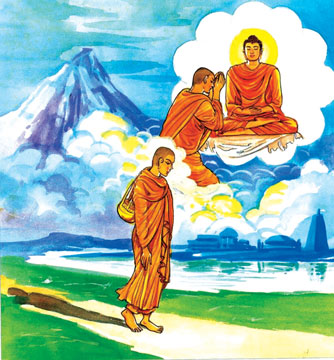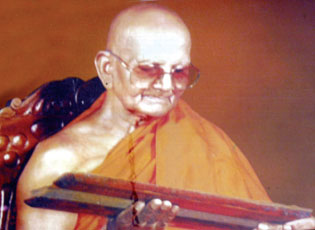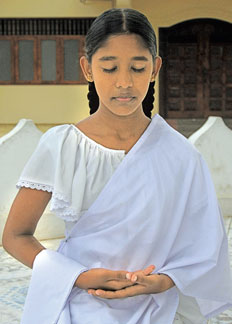|
Buddhist Spectrum
Jambuka who became an Arahant
Premasara EPASINGHE
During the time of Buddha, there were a number of Ascetics in India
who followed various practices. Out of them, the most outstanding
religious leader and thinker, was Mahavira or popularly known as
Nigantha Nath Putra, the founder of Jainism.
The second contemporary of the Gautama Buddha, was Makkali Gosala,
who belongs to the naked one's like Jaina religious leader. Then, there
were Purana Kassapa, Ajitha Keshakabali, Pakuda Kaccanaya, Sanjaya
Bellajjiputta and Jambuka. In their own right, all of them had a
following. They practised various methods to gain Vimukthi. Some
followed self-mortification and various peculiar methods. Most of them
believed in their own methods for emancipation.
 The story woven round Jambuka is quite interesting. To begin with, he
preached peculiar habits, with Ajivakas for sometime. The story woven round Jambuka is quite interesting. To begin with, he
preached peculiar habits, with Ajivakas for sometime.
Dhammapada – Chapter 5, Bala Vagga – Fools – stanza 70, relates to
the story of this monk Jambuka and how he later attained Arahatship and
joined the Buddhist Order.
While residing at the Jetavana Monastery, the Englightened One,
recited the following verse, given below, centred round Venerable Arahat
Jambuka.
Mase Mase Kusaggena
Balo Ghunjetha Bhojanam
Na so Sarikhatadhammanam
Kalam Agghat, solasim
(Month after month, a fool may eat only as much food as can be picked
up on the tip of a kusa grass blade, (like an ascetic) he is not worth a
sixteenth part of them, who have comprehended truth).
Jambuka hailed from a rich family in Savatthi. Because of his past
evil deeds, sins, he was born with some unbelievable peculiar habits. He
slept on the floor and never in a bed. Instead of rice, he ate his own
excrements.
The parents sent Jambuka, when he grew older to various religious
Ajivakas and Naked Ascetics. They never tolerated his food habits. They
drove him away. Then, he became his own master. In the nights, he ate
human excrement.
This abnormal man, during day time, stood still in one leg and kept
his mouth open. He used to proudly say he kept his mouth open, as he
lived only on air. He explained, he stood in one leg, because it would
otherwise be too heavy for the earth to bear him. He never sits nor
sleep. Therefore, he was known as Jambuka – a jackal.
The Indian society was such at the time, they venerated him as a sage
and offered alms and food. He said he do not take food. When his
followers forced him, he would take little food: with the tip of a blade
of grass (kusaggena). In following these abnormal peculiar habits,
Jambuka lived 55 (fifty five) years as an ascetic. He was naked. He
consumed excreta as his food.
The Blessed One, Gautama Buddha, saw in his divine eye or vision,
although, Jambuka suffered in this manner, due to his past evil deeds,
he has the credentials to attain the Bliss of Arahantship.
One day, Gautama Buddha, went to meet Jambuka.
The Buddha asked him to find a place to stay overnight. Jambuka
stayed on a stone slab and Gautama Buddha spent the night in a mountain
cave close to the place where Jambuka resided.
During the night, Chatummaharijika Devas, Sakra and Mahabrahma came
and worshipped the Blessed One. The entire forest was brightly lit up.
Jambuka saw the lights. In the morning, he enquired about the lights.
When Jambuka came to know, Devas, Sakra and Mahabrahma paid homage to
Buddha, Jambuka said:
”You must be an amazing wonderful person for the Devas, Sakra and
Mahabrahma to come and pay homage to you. I have practiced austerity for
fifty five years, living only on air, standing only in one leg. None of
the Devas, Sakra or Mahabrahma has never visited me.”
Buddha stated, “Jambuka, you were first deceived by some Ascetics.
Then, you deceived many of your followers. You cannot deceive the
Thatagatha Buddha. I know, due to your past sins, you led a miserable
life, even eating liquid and solid waste – excrement, urine, sweat,
passed from the system.”
Jambuka was terror-stricken, horrified. He repented for the evil
deeds done in the past and deceiving the people. Jambuka went down on
his knees and worshipped the Buddha. The Buddha gave him a piece of
cloth to wear. Then Buddha delivered a sermon. At the end Jambuka
attained Arahatship and joined the Order as a Buddhist monk. Jambuka's
pupils from Anga and Magadha too joined the Buddhist Order.
The Blessed One addressing them stated “Although your teacher had
lived austerely by taking food sparingly, it was not worth even one
sixteenth part of his present practice and achievement.”
Quintessential monastic personality
Divakara MOHOTTI - Kalutara Corr
The Sangha order was always in the forefront of rural leadership. At
the same time they strived to develop noble qualities themselves,
fulfilling monastic necessities such as food, clothing, shelter and
medicine. Such a monastic personality is Venerable Dediyawala Devasumana
Nayake Thera of Kalutara. He is chief incumbent of the Poorwarama Dharma
Vijaya Pirivena.
He possesses covetous traits: erudition, education, maturity,
discipline and living on the path of the Dhamma. He has shown his noble
qualities to his followers in various ways. He has been exhibiting
skills which astonished the visitors to the temple. He is popular in the
society.
 |
|
Ven.
Dediyawala Devasumana Nayaka Thera |
He was born on February 25, 1915, in a beautiful ancient village
Dediyawala in the Kalutara district. In 1936 he entered the well known
institute of learning, Dharmavijaya Pirivena, to study Ayurveda under
the great scholar of fame Ven Pandit Andawala Sri Sarananda Maha Thera.
Interest in practical Buddhism
After a few years the Maha Thera recognised his talents and
suitability to become a monk. He was admitted to the sasana under the
name Dediyawala Devasumana. The young monk Devasumana, who was given an
important task to learn Buddhism in addition to Ayurveda, was gradually
attracted to the practices of a Buddhist monk. He gradually gave up
Ayurveda studies in preference to the study of Buddhism and soon was
forced to accept the position of Chief Incumbent as his beloved teacher
Ven Andawala Sri Sarananda Thera passed away in 1945.
He had, by the time, luckily achieved necessary aptitudes to run an
institution of the calibre of Dhamma Vijaya Pirivena. His adventurous
nature and the cleverness in tackling whatever problems he had to face
in the administration of the Pirivena and the temple made it possible to
popularise the good name of the institution in no time.
One of the first and very important tasks was to build a suitable
path which made it easily accessible because the temple was situated on
a hillock difficult to approach. Not very long after with the assistance
of some genuine well-wishers, he was able to replace the long and steep
flight of steps with a motorable path as the access route to the
hill-top. The Chief Incumbent was really adept in forming good and
obedient pupils, with the influence of his erudite teacher.
Venerable Dediyawela Devasumana Thera has gifted a number of pupils
really learned in the Dhamma as well as properly disciplined in the
Dhamma and the Vinaya. Kalutara district is really fortunate to possess
such a group of well known Buddhist scholars who serve the country
enormously.
As reverend pupils of Ven. Dediyawala Devasumana Mahanayaka Thera,
they shine in the country commanding the respect and the honour. The
historical wonder in the temple is the four storied building which house
the residential quarters of the Maha Sangha.
The library and the Dhatu Mandiraya are but a glittering example and
the symbol of the Thera's unreserved determination, courage and
diligence. It is really an architectural monument in the modern times.
No one can deny it is a unique structure.
Help in need
He was always ready to help the needy young children and the novices.
Ven. Kalukodayawe Sri Pannasekara Mahanayaka Thera once referred to his
interest shown about progressive of the students who were handed over to
him for training.
No father of any child showed as much interest as Ven. Devasumana
Thera in the gradual progress in his pupils. It was seldom he comes to
inquire about his pupils. Almost every month during their period of
training he used to visit Vidyodaya Pirivena to inquire about their
behaviour and gives the authority to their teachers to punish harshly if
they neglect their duties as students.
He established a Daham Pasala for the children of Kalutra and its
environs and maintained it as a perfect institute. Annually he used to
gift the required books of the Dhamma and the required stationery to all
the students to celebrate his birthday.
The Kotte Sri Kalyani Samagri Dharma Sabha too honoured him with the
title 'Saddharma Keerthi' and appointed him to the post of Chief Sangha
Nayaka of the Kalutara District.
Kalutara Dhammavijaya Pirivena is the only temple in Sri Lanka where
there is a temple building constructed in honour of King Edward the VII.
The foundation stone had been laid for this residential quarter for the
Bhikkhu by the then Government Agent of Kalutara, A Plant, in 1911.
It was he who took interest to put up a beautiful building on this
foundation. The Chief Incumbent has committed another wonderful
construction when he could complete a fairly big Dagaba in the temple to
complete the premises in all Viharangas, the real part of a Buddhist
temple.
The town of Kalutara counts of 42 temples including the Kalutara
famous Bodhi.
Preserving for future
Our Nayaka Thera who is greately concerned about their future
maintenance has donated an ample sum to form a trust named 'Dediyawala
Devasumana Trust Fund' which will be administered by a Board of
Trustees.
Katukurunda Sri Suseemaramaya, Talahitiya Sri Anandaramaya,
Jayawardanagama Maithree Dhammayatana and Avarihena Bodhidhammaramaya
are the five great temples under his management at present. His well
known students who are serving the country are Ven. Rajakeeya Panditha
Andawala Devasiri Thera, Ven. Professor Neluwe Sumanawansa Thera,
Vichitrabhana Maggona Vimala Dhamma Thera, Ven. Ayagama Yasassi and Ven.
Dr. Bodagama Sumanajothi.
Ven. Dediyawala Devasumana Nayaka Thera thus has a very attractive
history and is being honoured and respected by the Buddhists in Kalutara
District.
Meditation for daily life:
Practising Ahare Patikkula Sanna - Part II
Dr Padmaka SILVA
Some people say although they practise Asubha that they do not
understand disgust. Is the name of the meditation disgusting meditation?
No. The name is Asubha Sanna. Many people try to generate a disgust
forcefully. That is wrong. Disgust is not a pleasure. It is a great
sorrow. If one wants to develop disgust there is no need to practise
Asubha. He can look at the toilet pit. To generate disgust in food there
is no need to meditate. One can look at stale food. Disgust arises. That
means the object of this meditation is not the generation of disgust.
 If disgust or nausea arises it is wrong. If we find it impossible to
eat when we try to develop Ahare Patikkula Sanna isn’t it meaningless.
If it becomes impossible to eat food the manner in which the meditation
was carried out is wrong. If disgust or nausea arises it is wrong. If we find it impossible to
eat when we try to develop Ahare Patikkula Sanna isn’t it meaningless.
If it becomes impossible to eat food the manner in which the meditation
was carried out is wrong.
Reducing the craving
The person who practises Ahare Patikkula Sanna reduces Rasa Tanha
(craving for taste). The desire for taste gets diminished. Does the
appetite for food get diminished? No. Appetite remains. What gets
diminished is Rasa Tanha. What happens if a disgust is felt? Appetite
gets reduced. If that happens it is due to practising the meditation in
a wrong manner. What has to get reduced? Rasa Tanha. Keep in mind that
appetite cannot get reduced.
Also there are some people who say that appetite gets reduced when
Asubha Bhavana is practised. If that happens it is also wrong. It is due
to practising incorrectly. That is why you are advised not to use
inappropriate words and develop disgust. What is expected from
meditating is not to develop a feeling of disgust. The object is not
developing a feeling of disgust. Although it is referred to as Ahare
Patikkula Sanna a disgust for food does not get developed from it. The
object is annihilation of Rasa Tanha. Reduction of craving for taste. It
does not affect one’s appetite. Appetite does not get annihilated. He
can consume food. Don’t be worried about it.
Because of ignorance of these facts we make mistakes. Become aware of
these and practise the Ahare Patikkula Sanna correctly. That also has to
be done little by little. While practising little by little get
accustomed to it. From this meditation also we can attain Samadhi. Even
higher Samadhis can be attained. This is a meditation in which all seven
Bojjhangas develop. It is a meditation which is specially suited to
annihilate Rasa Tanha. It is a big gain if we can annihilate the desire
for material food. It is not a small matter. It is an immeasurable gain.
Practising methods
This is something we understand. Something we should accept. It is
not an easy thing. It is not easy to get rid of the desire for food.
Practising this is the method for it. By practising the Ahare Patikkula
Sanna the thirst for material food gets reduced. Therefore don’t ignore
this meditation thinking that it is small or simple. Although it appears
to be simple the consequences are big.
Therefore practise this meditation continuously. Practise it
extensively. There is no harm in doing it two or three times a day. Do
it as you can. Initially it does not matter even if you practise it for
five minutes. Increase gradually from five to ten to fifteen etc. In
that manner increase the duration gradually. Then as time goes on we
will have enough work to do. There will be no room for laziness. There
will be no time for idle chatter. Why? Because there is work for us to
do. All problems crop up when we have no work to do. If we have work to
do there is no time for idle chatter.
We have several meditations to practise. We have to read books. Then
do we have time for useless things? We will be busy as ants. Do ants
have leisure? No. It works very fast. It has no time for anything else.
Like that we also become individuals with work to do. To become one who
does something there must be things to be done. So now we have things to
be done. Therefore practise these meditations little by little.
Difficulties encountered
Get used to do them continuously. Once confidence in these
meditations is built up the special consequence will be the opportunity
to develop a very exquisite life. We can live with ease. We can avoid
torments.
Is it comfortable to live on a heap of thorns? When he gets out of
that he can sleep if he wishes. Or he can sit or keep walking. Or he can
lean on to something. Or he can lie down. Or else he can keep chatting
with someone.
Now he is on the heap of thorns. Can he sleep when he is on the heap
of thorns? He cannot sleep. Can he keep standing? No. Can he lean on to
something? No. Can he keep chatting to someone? No. He is in suffering.
(Compiled with instructions given by Ven Nawalapitiye Ariyawansa
Thera)
[email protected]
Virtue itself rewards the toil of virtue
Ven Mahanuwara Sasanawansa Thera
He who desires to attain “Santam Padam” that peaceful gentle region
in the blue sky should act in the following manner; “Sakko” man creates
his own idea of self. He should skillful, upright, greatly upright,
obedient, gentle and humble.
Should be contented with the understanding that we are not here to
get all we can for ourselves out of life but to make the lives of others
happier, of easy sustenance, with little commitments, abstemious in
living, subdued in senses, wise not impudent and not over-attached to
families.
He should not commit even a slight wrong liable to be censured by the
wise.
He should cultivate universal sympathy wishing what so ever living
beings, be feeble, strong, long, short, stout, or medium, small or
large, seen or unseen, those dwelling far or near, those who are born,
who are to be born may all beings without exception be blissful.
He should cultivate human sympathy wishing may one not deceive
another and may none insult another either through anger or displeasure.
Just as a mother protects her only child as if he was her own life.
He should extend thoughts of unbounded kindness, to all beings.
He should cultivate thoughts of boundless affection to the entire
world, above, below; across everywhere without restriction, without
enmity, without any ill-will.
He should cultivate the thought of universal human sympathy whether
standing, walking, seated or asleep and as long as he is awake. This is
the noble ones (Buddha etc.) declare as the sublime Brahma – conduct
cultivating thoughts of universal human sympathy, compassion, benign
quality, and equanimity.
The person who undergoes this sublimation will be freed from wrong
views, become virtuous, and acquiring insight dispelling greed for sense
desires, does no more take conception in a mother's womb.
All good things in life are free. No material involvements needed to
develop these compassionate feelings. |



